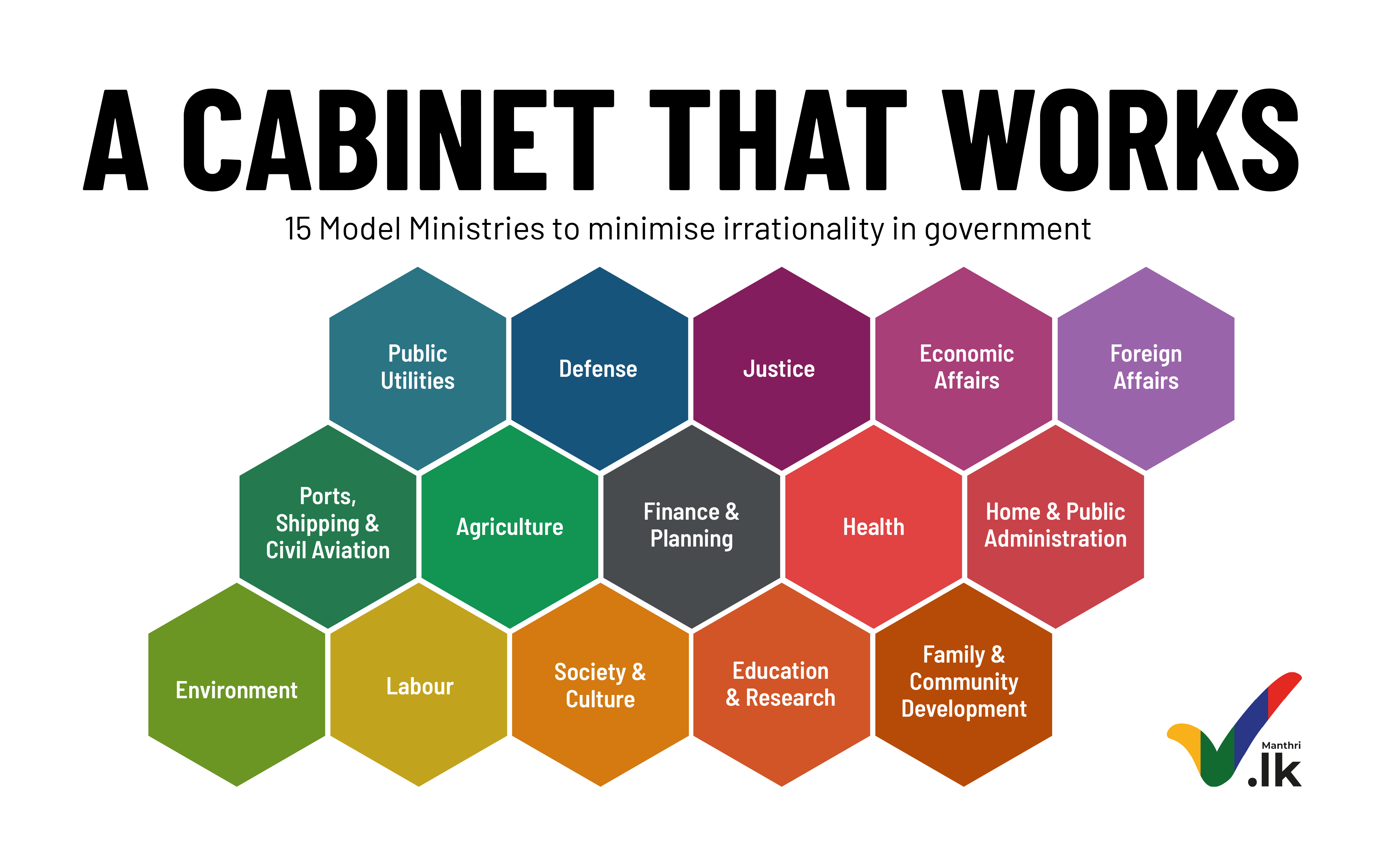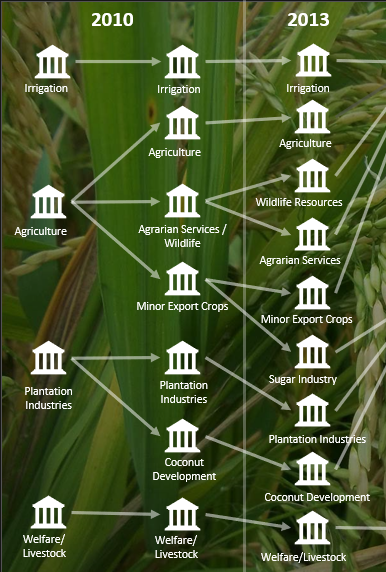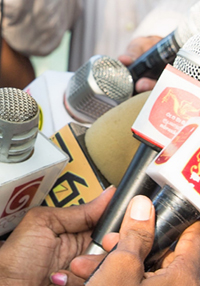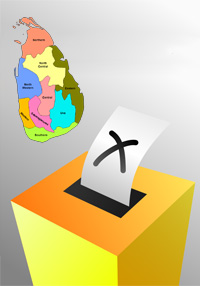A ‘Blueprint for a Rational Government in Sri Lanka‘, created by Verité Research and Manthri.lk, seeks to implement the recommendations from the White Paper on “A Rational Method for Cabinet Formation in Sri Lanka“, published in 2020. It lists down the duties and functions, institutions and acts to be implemented under the 15 ministries proposed in the annexures of the White Paper, following revisions that were supported by extensive expert consultation. This document is the blueprint by which governments can solve 3 key issues relating to irrational cabinet formation: 1. Misalignment of subjects Unrelated subjects being grouped together under one ministry. 2. Fragmentation of subjects Related subjects being split across different ministries. 3. Not having a fixed structure for ministries and their institutions Ministry purviews often change alongside ministerial appointments and shuffles, resulting in institutions shifting from ministry to ministry. The document takes on the form of an extraordinary gazette, and serves as a starting point for a more effectively and efficiently structured form of government.
Ministries are the overarching bodies that house relevant government institutions and functions within a particular subject area. They are responsible for the formulation, implementation, monitoring, and evaluation of national-level policies and strategies in their assigned sectors (such as health, education, and agriculture). In this regard, they coordinate with the institutions under their purview. Therefore, ministries—and by extension ministers—are vital to determining the institutional effectiveness and efficiency of service delivery by the public sector. However, public sentiment suggests otherwise. Public sector inefficiency has been a long-standing issue that successive governments in Sri Lanka have failed to address effectively. The general perception of the public is that the elected representatives who run government make an already inefficient system worse, and this perception is becoming more entrenched with time. The present paper seeks to address this gap between expectations of the role of ministers and ministries and reality as experienced and perceived by society. It highlights two types of problems that comprise the irrationality of present cabinet formation and seeks to address how effective and efficient governance in the public sector can be achieved. A Blueprint document that proposes a formulated rational structure for government, building on and refining the recommendations of the…
මැතිවරණ සමයක දී මාධ්ය නියාමනය කිරීම සදහා මාර්ගෝපදේශයන් නිකුත් කිරීමෙහි ලා ශී්ර ලංකාවේ මැතිවරණ කොමිෂන් සභාව මෙරට ව්යවස්ථාවෙන්ම බලගන්වා තිබේ. මැතිවරණ සමයක දී මාධ්ය නියාමනය සම්බන්ධයෙන් වර්තමානයේ පවත්නා කතිකාවත වඩාත්ම කේන්ද්රගතව තිබෙන්නේ රාජ්ය මාධ්යයන් නියාමනය කිරීම සදහා මෙම මාර්ගෝපදේශයන් භාවිතාවන ආකාරය පිළිබදවය. නමුත් එපමණකින් සීමා නොවී මැතිවරණ සමයක දී, පෞද්ගලික හිමිකාරීත්වයක් ඇති මාධ්ය නියාමනය කිරීමට පවා ශී්ර ලංකා ව්යවස්ථාවෙන් මැතිවරණ කොමිෂන් සභාව බලගන්වා තිබෙන ආකාරය මෙම දැනුම්වත් කිරීමේ සටහනින් අධ්යනය කෙරේ.
The Election Commission of Sri Lanka is constitutionally empowered to regulate the media during an election period by issuing media guidelines.The present discourse on media regulation during elections focuses on how these guidelines have been used to regulate state-owned media. This briefing note examines how the Election Commission is also constitutionally empowered to regulate the privately-owned media during an election period.
Anticipation of voter behaviour in the 2015 presidential election can be informed by the evolution of voter trends in previous elections. Analysis of election results in Uva over the last decade suggests that the war and war-victory created a deviation in voting patterns among UNP supporters. In the opportunities to vote in the early aftermath of the war-victory, a section of the UNP might have been persuaded to cast a ‘gratitude vote’ for the UFPA, especially President Mahinda Rajapaksa. The numbers suggest that in later elections the same voter might have decided to abstain (become a ‘sleeper’) thus making the UNP seem uncompetitive in electoral contests, even while the UPFAs’ vote share ebbed. The 2014 Provincial Council election in Uva signals a return from that deviation towards normal competitive politics.
Sri Lanka’s Western and Southern provinces went to the polls on 29 March 2014. The report analyses political party performance across using historical, polling division and preferential vote data sets. It also uses socio-economic data to assess the the impact of social cleavages on voting.
Three of Sri Lanka’s nine provinces, the Central (CP), North-Western (NWP) and Northern Provinces (NP), went to polls in September 2013. These provinces, when combined together, account for about a quarter of the island’s Sinhala and Muslim populations and over half the Tamil population. This report includes province time series analysis and cross cutting implications of the election results.
This report features a comprehensive analysis of the recently concluded Provincial Council elections, detailing the performance of major political parties, voting trends, and the emerging political landscape in post-war Sri Lanka. The voting environment, political campaigns and the various electoral politics preceding the election are also scrutinized to ascertain the level of transparency and accountability of the electoral system. The report includes data on previous elections to determine the evolution in socio-economic preferences related to voting patterns and also highlights the evolution of political preferences using a variety of visual data tools.




